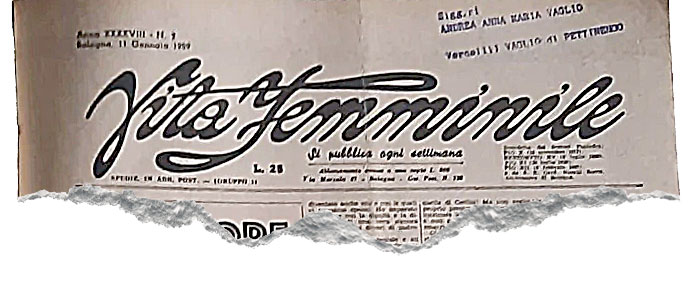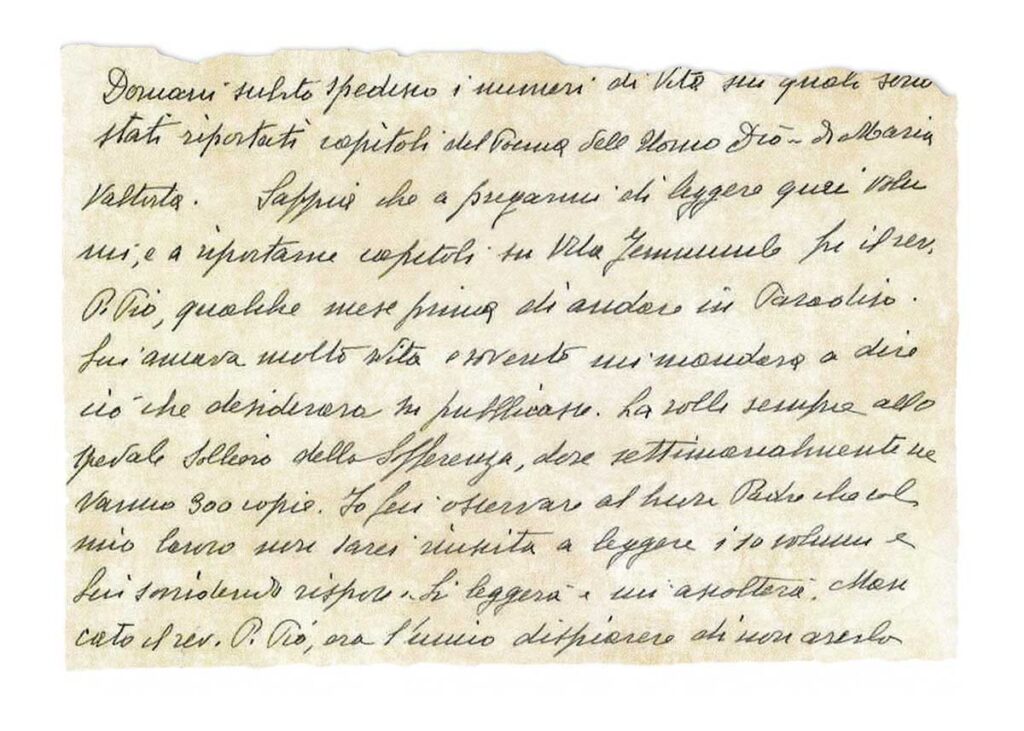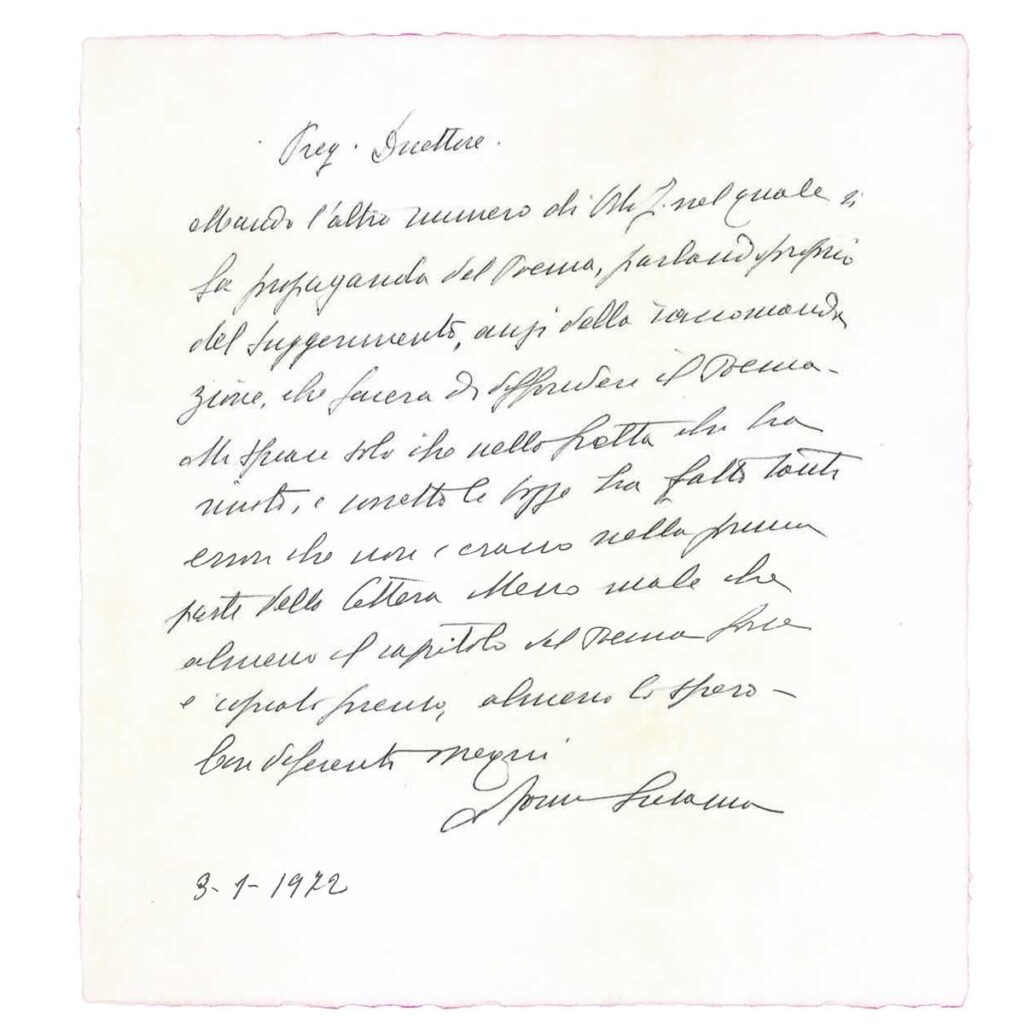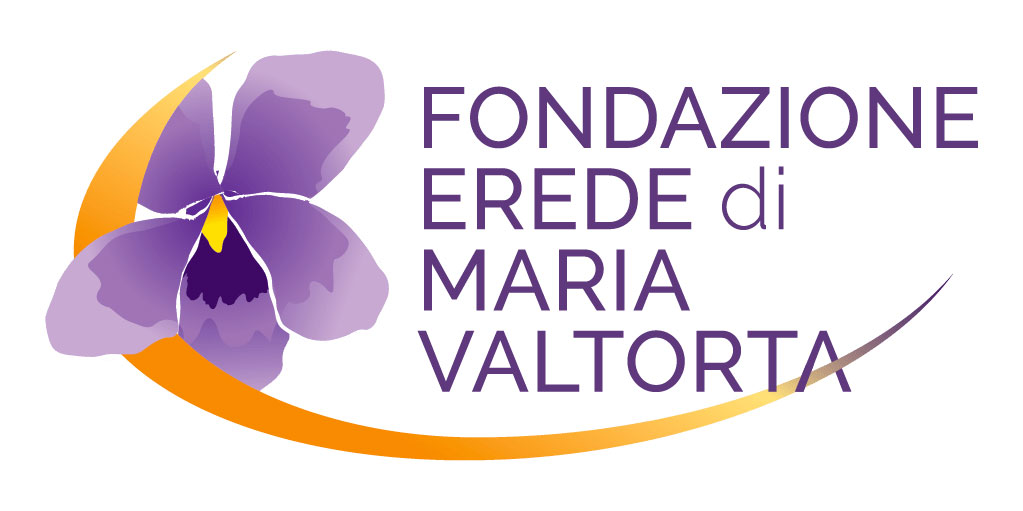DAfter the usual Eucharistic celebration, followed by the recitation of a third part of the meditated rosary, the spiritual director of the group, His Excellency Monsignor Bernardino Piccinelli, auxiliary bishop of Ancona, permitted the public reading of one of the most interesting testimonies concerning Padre Pio and his extraordinary relationship with Maria Valtorta of Viareggio, who died a few years ago in the odor of sanctity, and is the author of the famous literary works...
#PADRE PIO IN THE WRITINGS OF MARIA VALTORTA AND…
FROM "THE NOTEBOOKS OF 1943" BY MARIA VALTORTA
I saw and spoke (in a dream) to Padre Pio of Pietrelcina. I saw him, again in a dream, in ecstasy after Holy Mass; I saw his penetrating gaze and felt the scar of the stigmata on my hand when he took it in his. And, not in a dream but fully awake, I sensed his fragrance. No garden full of flowers in full bloom could emit the heavenly fragrances that filled my room on the night between July 25th and 26th, 1941, and on the afternoon of September 21st, 1942, precisely while a friend of ours was speaking to the Father about me (I was unaware that he had left for San Giovanni Rotondo). Both times, I later received the requested graces. Marta also sensed the fragrance. It was so strong that it woke her. Then, it suddenly ceased just as suddenly as it had come.
FROM "MEMORIES OF WOMEN WHO KNEW MARIA VALTORTA"
The professor (Nicola Pende) wanted to take Maria to Rome, to his clinic on Via Salaria. He would have transported her either in his beautiful, long, and comfortable car or by ambulance, as she preferred.
“Yes, yes, professor,” Maria would say. “Then, once I’m there, I would become a guinea pig for experiments.” In this way, she would deflect his numerous proposals. Once, she even said to me: “It’s useless… they won’t heal me. They’ll just make me suffer more, nothing else.”
And I asked: “Why not say that?”
And she replied: “Why should I share my secrets with others? No one can heal me anyway.”
She told me this many, many times, on many occasions. And again, more than once: “The Lord wants me like this! And even worse than this”; or: “Once healed, I would renew all my offerings.”
I remember once a Navy marshal, who lived nearby on Via Vittorio Veneto with only his wife, and whose name was Arena, spoke about Maria to Padre Pio during a visit. In fact, at that time, men especially could talk to the famous Capuchin, not only go to him for confession. So this marshal, who felt pity for Maria’s many sufferings, took it upon himself to ask Padre Pio to grant her the grace of healing, or at least to suffer a little less.
“Mind you, Father, that poor woman suffers a lot,” the man said to him.
“Yes, yes, I know, I know. But if I can do something, it will be for her soul. I won’t be able to do anything for her body, to relieve her pains.”
And while he was speaking with Padre Pio, there was a great wave of fragrance here. When he returned home, he came to visit Maria and told her about his request and the response he had received. She smiled and said: “Ah, yes! He’s right.” And she asked him the time of his conversation with the friar from San Giovanni Rotondo. Well, the time, and of course the day, exactly matched the moment of that wave of fragrance.
(TESTIMONY OF MARTA DICIOTTI)
FROM "THE NOTEBOOKS OF 1944" BY MARIA VALTORTA
July 25, 1944.
Yesterday, no dictation. Rest for my poor shoulders, worn out from all the writing of the past days. But not a lack of heavenly favors.
First of all, much peace, and then the visible presence of my Friends from Heaven, their caresses, and, noticeable to others as well, that fragrance of roses which sometimes is so pure that it feels as if there were clusters of freshly picked roses in the room, and other times it seems mixed with a faint smell of iodine or vinegar, as if the roses had withered slightly on their stems. The fragrance comes slowly, at first just a hint, then it becomes more pronounced and grows, arriving in waves, sometimes very intense, other times less so. Then it fades just as it came.
Generally, it is the scent of roses. But sometimes it is a complex fragrance, as if there were gardenias, jasmines, violets, lilies of the valley, lilies, and tuberoses. I never smell the scent of carnations, irises, daffodils, freesias, or other flowers. Only those I’ve named above.
I think it is brought by some “Friend” or comes with the blessing of Padre Pio. But I’m not certain. I greet it every time with a thank you, saying: “Whoever you are, thank you for your tangible protection.” Because I feel protected when I’m among those fragrances, even more so than usual. As if I were in the arms of someone who loves me with the perfection of a saint.
November 29, 1944.
[…]
Eight days ago, on November 22, the night before Marta’s trip to Lucca to hear about the auto-transport permission, in the brief sleep of dawn, I dreamt that I was walking towards Viareggio (on foot) with Marta, and we encountered Padre Pio on the way, or a Franciscan, but to me, it was Padre Pio. He looked at me and said, as if speaking to himself: “But it’s bitter! Having gotten one’s hopes up for the return, and now so much delay!” I turned, a little resentful and emotional, and said: “What? What?” And he replied: “Nothing. I was saying that it is bitter to have gotten one’s hopes up for the return and now face so much delay.” He said it twice and disappeared.
I woke up, distressed, and said to Marta: “You’ll see, nothing will happen.” Marta said: “But no! In fact, Padre Pio came to tell you that the delay has been bitter, but it’s over.” And I said: “No, no. You’ll see, it’s just starting now. He was too sad when he said those words. He was pitying me.”
Marta went to Lucca… and learned that we couldn’t leave until after the 30th because permission had been denied.
It is said that one day Padre Pio made a prediction about the recognition that the ecclesiastical authority would give to Maria Valtorta’s work. While the persecution continued, he reassured: “Someone will come who will do everything.”
It is said that one day Padre Pio made a prediction about the recognition that the ecclesiastical authority would give to the work of Maria Valtorta. While the persecution was ongoing, he reassured: “Someone will come who will do everything.”
LETTERS FROM READERS
To Dr. Emilio Pisani,
Dearest in Jesus!
My name is Rosi Giordani, a spiritual daughter of Padre Pio. I am from Bologna, but I have been living here for many years with my mother, who, like Maria Valtorta, was born in 1897. My father has been resting in the cemetery of this town for twelve years. In 1981, I was present with my mother in the Basilica of Santa Maria Annunziata in Florence for the anniversary celebration of Maria Valtorta’s death. I was with dear Domenico Fiorillo; I embraced Marta and listened to her beautiful speech.
I am writing mainly to tell you the following: a spiritual daughter of Padre Pio from the earliest times, Mrs. Elisa Lucchi, known as Malvina, from Forlì, one year before Padre Pio’s death, asked him in confession: “Father, I have heard about the books of Maria Valtorta. Do you advise me to read them?” The Father’s reply: “I don’t just advise you, I order you!”
San Giovanni Rotondo, January 7, 1989.
Rosi Giordani

Three Autographed Letters from Nonna Susanna
Nonna Susanna was the signature for a column in the magazine Vita Femminile of Bologna.
The first letter, without a date, is from the year 1972.
Most esteemed Mr. Director,
Tomorrow, I will immediately send the issues of Vita that include chapters from The Poem of the Man-God by Maria Valtorta. Please know that it was the Reverend Father Pio who urged me to read those volumes and include chapters in Vita Femminile, a few months before he went to Heaven. He loved Vita very much and often sent me messages about what he wanted to be published. He always wanted it at the Casa Sollievo della Sofferenza hospital, where 900 copies are distributed weekly. I told the good Father that, with my work, I wouldn’t be able to read the 10 volumes, and he smiled and said: “You will read them and listen to me.”
When the Reverend Father Pio passed away, my only regret was not having fulfilled this wish. I wrote to Reverend Father Avidano, explaining Father Pio’s desire for those volumes to enter households, and since Father Avidano had read and knew the works, I ordered them to be sent as a gift to our members. Father Avidano sent me the first volume as a gift, and later, in September, he came to Bologna and brought me the ninth volume, telling me that he meditated on it and cried.
The Reverend Pastor of St. Ruffillo was present, and we gave him the complete collection as a gift. In the few remaining months of Father Avidano’s life, I continued to have him send the books. He advised me to start obeying Father Pio, but I only managed to begin on May 30, 1971. That was the first time I spoke about it in Vita. Before that, I had bought copies in Bologna from the bookstore […], and later from the Sisters of St. Paul, encouraging people to visit these bookstores to get to know the books.
Certainly, with the prayers of the good Father Pio, I was able to give away 16 complete collections in Bologna, bought from different bookstores, and also received through the kind Mrs. Iva Olmo, my dear friend who works with me but does good discreetly. Through Vita and articles extracted from newspapers, I wouldn’t have accomplished anything; instead, I preferred to publish the chapters directly, as Father Pio instructed through a friend of mine. Then, to relatives like the Parusio family of Pavia, the […] family of Tempio in Sardinia, and the […] family of Seregno—people in need of help and companionship—I had the books sent by Mrs. Iva Olmo.
Finally, I thought to request books from Vita Femminile as well, but it is still Nonna Susanna, with the prayers of Father Pio and Reverend Father Avidano, who has now managed to give away 30 complete collections, sourced from various places so that the bookstores became enthusiastic and started selling them in Bologna. Through acquaintances, the books even reached the home of an industrialist, introduced by a family educator who was well-regarded. Now, the books are spreading within their circle of acquaintances.
They were given as gifts among doctors, officers, and a military chaplain who was very enthusiastic.
I wrote this so that you would know that the credit for promoting Maria Valtorta’s volumes goes to the Reverend Father Pio of Pietrelcina and the Reverend Father Avidano. I now await confirmation that the first volume has arrived (so far, it hadn’t reached Prato) and elsewhere. Mrs. Iva Olmo will order more collections.
I cannot always request from Vita because all the good we do is best kept hidden. Since I am hard of hearing, Mrs. Iva Olmo assists me. Forgive the length of this letter, but I felt it was necessary to share this with you.
With respectful regards,
Nonna Susanna

Esteemed Director,
I am sending another issue of Vita Femminile in which there is promotion of The Poem of the Man-God, specifically mentioning the suggestion—or rather, the recommendation—to spread The Poem. I regret, however, that in the rush, the person who reviewed and proofread the drafts made many errors that were not present in the first part of the letter. At least, the chapter of The Poem may have been copied correctly—or at least I hope so.
With respectful regards,
Nonna Susanna
January 3, 1972

Most Esteemed Director,
As I wrote to you in the past, this year the volumes of The Man-God by Maria Valtorta would be given as a prize. I enclose the second issue of Vita Femminile with the announcement and a chapter that includes the recommendation of Reverend Father Pio of Pietrelcina.
You will also receive a copy of the third issue of the year, which contains the following chapter along with the recommendation of another beloved Capuchin Father, who spent 27 years in a wheelchair. He underwent nine surgeries and died in the state of sanctity on December 5 of last year. This Father wrote very well, and he was known far and wide, so much so that even his burial was a triumph, and people now visit the place where he used to confess and comfort from his wheelchair. Many have been helped by him, and [indecipherable word]. This Reverend Father wished for the knowledge and distribution of The Poem of the Man-God, and so I have included his words as well.
After my brother, who used to gift me the books I desired, passed away, I could no longer purchase them as before. However, I have tried to encourage purchases through correspondence, and I know that many have acquired it and continue to do so. Now, I also use correspondence to introduce Azaria.
This letter carries my New Year wishes; I hope you appreciate the efforts I make to promote The Poem, which I would like to see enter every home.
With respectful regards and gratitude,
Nonna Susanna
January 2, 1973

